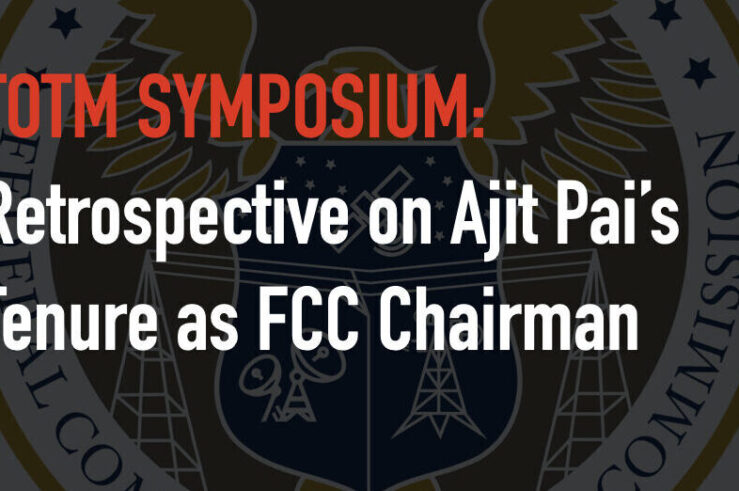Showing results for: “digital markets act”
ICLE files an Amicus Brief In Fox v. Aereo Killer
On Wednesday, the International Center for Law & Economics, along with the Competitive Enterprise Institute, filed an amicus brief in the Ninth Circuit Court of Appeals supporting the appellants in Fox Television Stations, Inc. v. Aereo Killer LLC. The case arose out of Aereo Killer’s Internet video platform, from which it would retransmit content without ... ICLE files an Amicus Brief In Fox v. Aereo Killer
Should Patent Hold-Out Concerns Trump Patent Hold-Up Misgivings?
Over the last few years competition authorities in the US and elsewhere have repeatedly warned about the risk of patent hold-up in the licensing of Standard Essential Patents (SEPs). Concerns about such risks were front and center in the recent FTC case against Qualcomm, where the Court ultimately concluded that Qualcomm had used a series ... Should Patent Hold-Out Concerns Trump Patent Hold-Up Misgivings?
Wright is Right and Price-Cost Safe Harbors are Wrong: The Raising Rivals’ Cost Paradigm, Loyalty Discounts and Exclusive Dealing
Guest post by Steve Salop, responding to Dan’s post and Thom’s post on the appropriate liability rule for loyalty discounts. I want to clarify some of the key issues in Commissioner Wright’s analysis of Exclusive Dealing and Loyalty Discounts as part of the raising rivals’ costs (“RRC”) paradigm. I never thought that I would have to defend Wright against ... Wright is Right and Price-Cost Safe Harbors are Wrong: The Raising Rivals’ Cost Paradigm, Loyalty Discounts and Exclusive Dealing
Forbes commentary on Susan Crawford’s “broadband monopoly” thesis
Over at Forbes Berin Szoka and I have a lengthy piece discussing “10 Reasons To Be More Optimistic About Broadband Than Susan Crawford Is.” Crawford has become the unofficial spokesman for a budding campaign to reshape broadband. She sees cable companies monopolizing broadband, charging too much, withholding content and keeping speeds low, all in order to ... Forbes commentary on Susan Crawford’s “broadband monopoly” thesis
Introductory Post: The United States v. Google
Google is facing a series of lawsuits in 2020 and 2021 that challenge some of the most fundamental parts of its business, and of the internet itself — Search, Android, Chrome, Google’s digital-advertising business, and potentially other services as well. The U.S. Justice Department (DOJ) has brought a case alleging that Google’s deals with Android ... Introductory Post: The United States v. Google
How Chairman Pai Restored the FCC’s Independence
Chairman Ajit Pai will be remembered as one of the most consequential Federal Communications Commission chairmen in history. His policy accomplishments are numerous, including the repeal of Title II regulation of the internet, rural broadband development, increased spectrum for 5G, decreasing waste in universal service funding, and better controlling robocalls. Less will be said about ... How Chairman Pai Restored the FCC’s Independence
The Ajit Pai FCC on Radio Spectrum Allocations
Disclosure: The one time I met Ajit Pai was when he presented a comment on my book, “The Political Spectrum,” at a Cato Institute forum in 2018. He was gracious, thorough, and complimentary. He said that while he had enjoyed the volume, he hoped not to appear in upcoming editions. I took that to imply ... The Ajit Pai FCC on Radio Spectrum Allocations
The Four Ways of Spending Data
In Free to Choose, Milton Friedman famously noted that there are four ways to spend money[1]: Spending your own money on yourself. For example, buying groceries or lunch. There is a strong incentive to economize and to get full value. Spending your own money on someone else. For example, buying a gift for another. There ... The Four Ways of Spending Data
Medical Self-Defense, Organ Markets, and the Poor
Eugene Volokh has posted a series discussing his new article (forthcoming in Harvard L. Rev.) “Medical Self-Defense, Prohibited Experimental Therapies, and Payment for Organs,” which I point out because the article claims that bans on organ payments violate patients’ medical self-defense rights. As readers of TOTM know, organ markets are a topic of substantial interest ... Medical Self-Defense, Organ Markets, and the Poor
Conference Announcement: Merger Analysis in High Technology Markets at GMU
I am very pleased to announce the “Merger Analysis in High Technology Markets” on behalf of my colleague Tom Hazlett, myself, and the Information Economy Project of the National Center for Technology and Law. The conference will be held at George Mason University School of Law on February 1, 2008 from 8:15 am-2:30 pm. Below ... Conference Announcement: Merger Analysis in High Technology Markets at GMU
The Law & Economics of Interchange Fees Symposium
For the uninitiated, the interchange fee is the fee charged (usually) by the credit card issuing bank (the cardholder’s bank) to the credit card acquiring bank (the merchant’s bank) to settle a credit card transaction between the cardholder and the merchant. Interchange fees, as well as various rules set by credit card networks governing credit ... The Law & Economics of Interchange Fees Symposium
When markets let corporations be good
In my article, Accountability and Responsibility in Corporate Governance, I explored the complex relationship between social responsibility and markets. I noted among other things that social responsibility is a way to sell products, so it’s hard to untangle whether success let’s firms be “good,” or whether “goodness” causes firms to be successful. A new article ... When markets let corporations be good








